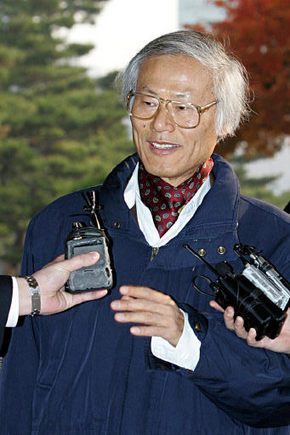 |
|
Kang Jeong-koo
|
Controversial former professor says that U.S. pressure, conditions souring deal
Kang Jeong-koo, a former Dongguk University professor accused earlier this year of violating the National Security Law and subsequently forced out of the university, will publish a paper on the original transfer of operational control of the South Korean armed forces.
Kang was arraigned in April for violating the controversial law by allegedly praising the North in speech. The National Security Law has been called unconstitutional by civic groups and has been targeted by the U.N. as a violation of human rights.
According to Kang's paper, the U.S. put pressure on the South Korean government to accept the transfer of military operational command of the South Korean armed forces, which has been under the aegis of U.S.-led U.N. forces since the start of the Korean War in 1950. South Korea took back peacetime control from U.S. forces in 1996, and in recent months, the U.S. and South Korea have stepped up discussion of the timeline for wartime control transfer back to Korea, with Washington pushing for 2009 and Seoul aiming for 2012.
Kang will present a paper titled, "The True History in the Process of Losing Wartime Operational Control and the Importance of the Transfer" at a forum due to be held at Seoul National University under the sponsorship of the Korean Sociological Association on December 15. At the forum, he will stress that military command was transferred unlawfully out of South Korea's hands in a manner both conditional and forceful. Professor Kang is also expected to insist on the necessity of the return of wartime operational command to South Korea.
According to Kang, while wartime operational control of South Korean armed forces was officially transferred to the U.S. on July 16, 1950, General Douglas MacArthur in fact demanded the transfer of command on June 29 on condition that the U.S. would commit its troops to the Korean War, at which point then-president Syngman Rhee ordered the South Korean Army to be taken under MacArthur's command. "The actual transfer happened two weeks before the officially scheduled transfer, and Syngman Rhee had no alternative but to accept the U.S.'s demand,'' said Kang. Kang noted that the original transfer of command violated South Korea's constitution because Rhee failed to take into account legal formalities such as approval of the move by the National Assembly or consultation with the State Council - comprised of the ministers - over issues related to national sovereignty. Kang pointed out that a letter at the time from Syngman Rhee said, "As long as the current hostility continues, South Korea will transfer the entire command of its army." Given this climate, Professor Kang said, the transfer was conditional from the start. After the 1953 cease-fire that ended the Korean War, South Korea regained command of a part of its army from the U.S. forces for a short while, added Kang. Due to the conditional terms of the transfer, and the fact that only a truce rather than a peace treaty ended the war, there was controversy over South Korea regaining wartime command, he said. However, he continued, the U.S. retained wartime operational control by exercising pressure on the government to put the brakes on Rhee's plans for reunification through an invasion of the North, said Professor Kang. When confrontation between the two nations intensified, the U.S. carried its position on the fact that it was providing aid to South Korea, and then-president Rhee couldn't help but accept the U.S.'s demands, added Kang. In response to Kang's claims, Professor Park Myung-lim of Yonsei University said, that "I have not yet gone over Kang's article, so I have few things to say about it yet. However, the existing research is that then president Syngman Rhee voluntarily handed over command of the South Korean military." Please direct questions or comments to [englishhani@hani.co.kr]





